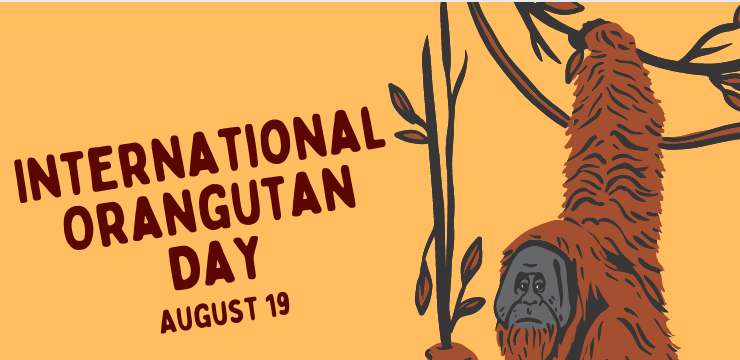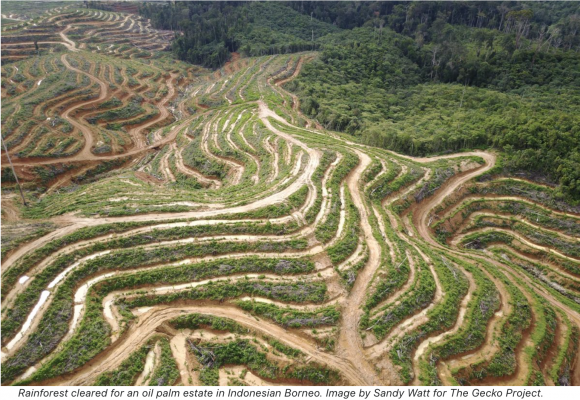
The Root of the Issue – Deforestation in Palm Oil Production + Orangutan Endangerment Understanding How Deforestation for Palm Oil Has Led Orangutans to the Brink of Extinction
August 15, 2022
Rainforest-dwelling animals face imminent threats from deforestation due to palm oil production. International Orangutan Day is this week on August 19th, so let’s talk about why we should raise awareness about this great ape and the environmental crisis it faces.
How is palm oil production related to deforestation?
Palm oil is found in nearly 50% of all household and food goods in the West, from candy and chocolate, to shampoo and lotion, to household cleaning products and more, and at the environmental cost of certain species. To meet this consumer and corporate demand, rainforests are being cut down in order to plant the African palm oil tree. A recent report from the International Union for the Conservation of Nature (IUCN) states that although palm oil is causing deforestation and endangering many species such as orangutans, other kinds of vegetable oils could cause equal amounts of harm to the environment, such as soybean oil in South America. The report also mentioned that the European Union is aiming to phase out the use of palm oil in biofuels by the year 2030, acknowledging environmental and human rights violations in the production and harvesting processes of the commodity.
What is International Orangutan Day and how does palm oil production affect orangutans?
International Orangutan Day is a global effort to raise awareness on this threatened species, especially since humans are the main reason for its endangerment through deforestation from unsustainable palm oil harvesting. Orangutans are native to the rainforests of Indonesia and Malaysia, especially living in Borneo and Sumatra. They are a prime example of a species directly impacted by anthropogenic climate change, as they spend up to 90% of their days hanging from treetops searching for food, thus impacted by the deforestation caused to grow the palm fruit. As described by a video from Take Part, the palm oil industry is the leading cause of extinction for orangutans as rainforests are being cut and burned to make way for the African palm oil tree plantations. According to the World Wildlife Fund, Malaysia and Indonesia produce over 85% of the world’s palm oil. This primate is especially impacted by the human dependence on palm oil, as mentioned that it is now found in roughly half of household and food goods in the West. Although August 19th raises awareness on orangutans, the production of palm oil among other vegetable oils also destroys the habitats of animals like tigers, elephants, bears, and rhinos.
What can we do to better this crisis?
The real root of this issue proves to be deforestation. Simply banning palm oil would not resolve the root issue due to the global demand for vegetable oil products. If palm oil is banned, the production of another type of vegetable oil would likely take its place as a leading cause of deforestation, so companies and plantations must therefore find ways to manage the rate of deforestation. Voicing opinions as consumers is also a means by which to show companies what issues we care about. Easy ways to do this are to make the switch to palm oil-free products by checking the ingredients on everyday items. Orangutan Foundation International also provides a useful preliminary list of safe choices and a scavenger hunt submission form for palm-oil free products here. Although sustainable palm oil does exist, such as products certified by RSPO, we recommend always researching the certification first as some programs can still find ways to permit deforestation. As explained by a MongaBay article, corporations and governments must improve the planning of new palm and vegetable oil plantations and ensure better management and oversight of forest patches left untouched in plantations.
For more information, check out and consider donating to The Centre for Orangutan Protection, Orangutan Foundation International, the Sumatran Orangutan Society, The Orangutan Project, and Orangutan Outreach.
Be sure to follow us on Instagram @sustainchapman and subscribe to our Green Panther Newsletter here!
